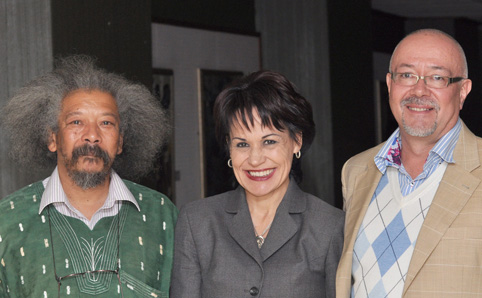Latest News Archive
Please select Category, Year, and then Month to display items
12 January 2024
|
Story Nonsindiswe Qwabe
|
Photo Sonia Small
 Since joining the UFS in 2008, Dr Grey Magaiza has worked extensively on approaches that can foster the socio-economic transformation of societies.
Since joining the UFS in 2008, Dr Grey Magaiza has worked extensively on approaches that can foster the socio-economic transformation of societies.
“The future should be one where communities can decide on their development agenda and futures. That’s the most important for me.” Dr Grey Magaiza, Deputy Director of the Centre for Gender and Africa Studies (CGAS) and Head of the Community Development programme on the Qwaqwa Campus, is passionate about capacitating communities to be agents of change and advancement. His vision for the future emphasises the empowerment of communities to take charge of their development by actively participating in decision making and the implementation of development projects that can improve their lives.
Since joining the UFS in 2008, Dr Magaiza has worked extensively on approaches that can foster the socio-economic transformation of societies. Over the years, he has crafted his research speciality into one that he is most proud of – being an interdisciplinary scientist immersed in the development of communities.
“I’m in a fortunate position of researching what I like. I say ‘fortunate’, because I’ve taken the time to understand what I’m passionate about, which is the overall field of rural livelihoods and livelihood futures – in short, community development. My research starts from an engaged university, understanding the elements that a university must use to enhance transformation and relevance to its immediate community in terms of development.”
One of the ways he has done this is by looking at social entrepreneurship as a development approach for young people in a rural setting. Through workshops with non-profit and civic organisations in Qwaqwa, Dr Magaiza has been helping these organisations to map out their needs and actively meet them through the involvement and support of external role players.
“We understand that communities are part of the national development agenda, but even that national agenda respects community knowledge and intentions and allows communities to shape their identity. A critical enabler of this is community organising. You bring back the capacity in communities to have dialogues on issues affecting them as spaces for engagement, knowledge exchange, and for people to just talk about their way forward.”
By enabling communities to define their development agenda, they can address their specific needs, challenges, and aspirations, he said. “When I look at livelihood futures, it’s quite an exciting aspect of my work – it’s like looking into a fortune tellers’ globe, because you’re not deciding for communities what they should do, but the communities themselves take those decisions.”
UFS outlines research achievements
2011-09-02
|

|
|
At the launch of the 2010 Annual Research Report, were from the left: Mr Robert Kriger, the director for Policy and Strategy at the National Research Foundation (NRF); Prof. Driekie Hay, Vice-Rector: Academic and Prof. Frans Swanepoel, Senior Director: Research Development.
Photo: Stephen Collett
|
The University of the Free State (UFS) is well on course for delivery on its most important academic duty as a research university. This was the message that came forward at the launch of the 2010 Annual Research Report of the UFS on 30 August 2011.
Speakers at the launch, which included Prof. Jonathan Jansen, Vice-Chancellor and Rector, as well as Prof. Driekie Hay, Vice-Rector: Academics outlined the key strategies and achievements of the UFS for the 2010 academic year. This included the establishment of a Postgraduate School at the UFS, the first of its kind at a public university in South Africa. Prof. Hay told guests that the aim of the Postgraduate School was to broaden research and deepens scholarship on postgraduate education in the country. She highlighted some initiatives the UFS undertook in 2010 to build and maintain its intellectual capital. Some of these initiatives included the appointment of seven senior professors and recruiting more female and black scholars and academics.
Also speaking at the event was Mr Robert Kriger, the director for Policy and Strategy at the National Research Foundation (NRF). Kriger reflected on the brilliant minds of scholars such as Archie Mafeje, Lewis Nkosi and Dennis Brutus and argued for efforts to increase the country’s research output.
Some highlights of the 2010 Annual Research Report:
- The total funding available for research at the UFS increased from approximately R199 million in 2009 to just over R210 million in 2010. A total of R31.8 million was made available from central university funds.
- In 2010 the UFS was home to 92 NRF-rated researchers. During 2010, four researchers applied for re-evaluation and of these, two improved their rating, while a further five received a first-time rating.
- The Faculty of Natural and Agricultural Sciences continue to be the most prolific producer of publications in accredited journals, while the Faculty of Education has shown a 54% increase in its publication output.
- Staff members in the Physics department at the UFS Qwaqwa Campus published 22 papers in international peer-reviewed journals during 2010.
- Also at the Qwaqwa Campus: Ms Khethiwe Mtshali,a postgraduate student in the parasitology research unit of the Department of Zoology and Entomology, received a best Honours presenter award at the 1st Annual Research symposium of the National Zoological Gardens of South Africa.